Covenant Theology? Agree or disagree?
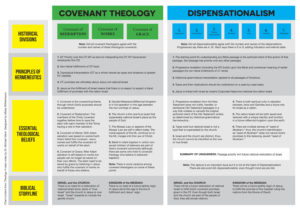
Here’s a comparison chart I made contrasting the essentials of covenant theology and dispensationalism, based on content from my Theology 4 class with Dr. Michael Vlach. You can download the PDF here.
My short answer would be, no, I do not hold to covenant theology, since I don’t think it is justifiable by Scripture. That being said, I do recognize that there are many godly men who do hold to that view, men whom I have benefited greatly from, especially as it comes to other aspects of theology (such as soteriology). Even though the essence of covenant theology is often presented to be the theological covenants that seek to tie together the broader storyline of Scripture, I actually don’t think this is the most helpful way to look at the most foundational distinctives of covenant theology. Granted, I do not believe that the theological covenants (Covenant of Redemption, Covenant of Works, Covenant of Grace) are found presented as such in Scripture. But at the same time I do not think it has the most drastic effects on your theology, even if one were to accept the theological covenants as legitimate descriptions of biblical truths. A good example of this was S. Lewis Johnson, who was a dispensationalist and yet recognized the theological covenants of covenant theology as legitimate descriptions of the truths taught in Scripture. My personal opinion is that the theological covenants are not necessarily fully wrong, but mainly just confusing and not very helpful in theology and biblical interpretation.
I think the most crucial aspect of covenant theology, the aspect that I would most disagree with, would be in the realm of their hermeutical principles, especially when it comes to interpreting Old Testament promises and prophecies. Since covenant theologians trace their roots to the reformation, they naturally believe in the historical-grammatical method of interpreting the Bible (which I also hold to). However, when it comes to prophetic portions of Scripture, they seek to apply a form of ‘spiritualizing’ to arrive at the meaning of the text. The problem with this kind of ‘spiritualizing’ is that then Israel is made to mean the church, the physical land is made to simply mean some sort of spiritual existence, and the one-thousand-year reign of the Messiah on this earth is changed to simply a spiritual truth without any actual reign of Christ on the throne of David in Jerusalem. To summarise, the hermeneutical problems that I see in covenant theology are the following: the belief in the NT reinterpreting the original meaning of the OT, non-literal fulfillments of OT promises, the use of typology in reinterpreting many OT passages, Jesus being the fulfillment of Israel and therefore no need for national Israel.
I think the most crucial aspect of covenant theology, the aspect that I would most disagree with, would be in the realm of their hermeutical principles, especially when it comes to interpreting Old Testament promises and prophecies.
Even though I do not see the theological covenants as most essential to the system, they do obviously still play a major role. In principle, I do not find it that problematic to use these theological covenants to express the biblical truths they are seeking to convey, however, the problem comes when these theological covenants are used as a tight grid through which the rest of Scripture is to be interpreted. When the Covenant of Grace is seen as the overarching covenant which God has made with man, and the biblical covenants (Abrahamic, Mosaic, Davidic, New Covenant) are seen as simply different manifestations of the same one covenant, it then easily forces one to think of these biblical covenants more exclusively in regard to spiritual salvation only, rather than recognizing the other aspects of the covenants, such as the promises given to Israel for a physical land given to them (which will be realised in the millennial kingdom of the Messiah). When you seek to interpret all the biblical covenants in light of a theologically constructed covenant, it causes you to focus on the commonalities while at the same time not doing justice in interpreting the distinctives of these covenants. The main issue where I completely disagree with most covenant theologians is with their view of the church replacing national Israel. I think this form of thinking has profound effects on our understanding of the Bible, since if the promises made to Israel in the OT can suddenly be ‘spiritualized’ and applied to the gentile church instead, what guarantee do we have to trust God’s promises to us? After all, could not the same happen to us, in that the promises given to us are later reinterpreted to mean something else, and applied to someone else instead of us? As much as I respect my brothers who are covenant theologians, I do also have to say that I believe this kind of thinking if taken to its logical conclusion, will affect our understanding of God’s faithfulness. Since God promised national Israel that they will have a physical land, how could they trust him to be fully faithful, if they would have known that later this promise of a physical land will be spiritualized to only refer to a heavenly spiritual existence, and that in fact the gentile church is now the recipient of these blessings, not national Israel itself?
The strength that I would see in covenant theology is the emphasis on God having one ultimate purpose that he is working throughout all the ages, he is in no way changing his mind as he is going, rather he determined before time began that he would do what he has done. I also think that a strength of this system is the emphasis on the importance of covenants in the Bible. However, both of these strengths I believe at the same time are great weaknesses for this system, since in their emphasis of focusing on God’s unified purpose in this world, they have easily sought to put Scripture in too tight of a mold, so that it ends up being distorted in some aspects. We cannot force the Scriptures to fall into a mold. Also, their emphasis on the importance of covenants is admirable, but then their belief in these theological covenants not directly based in Scripture, tends to downplay a focus on the actual biblical covenants and their implications.
Even though I do not agree with the conclusions of covenant theology and believe that some of these beliefs can be very harmful for our understanding of biblical truth, I am nonetheless truly thankful for my covenantal brothers who affirm the authority of Scripture and the clarity of the gospel. Yet, I also wish they would reconsider the biblical teaching in these aspects of their theology, especially as it relates to God’s purpose for national Israel and the literal fulfillment of God’s promises.
Dispensationalism? Agree or disagree?
My short answer would be, yes, if rightly defined I do hold to a dispensational view of approaching Scripture. That being said, I would still be slightly hesitant in describing myself as a ‘dispensationalist’, especially if I had no opportunity to then explain in more detail what I mean by that title. I have seen it first-hand that there are many strange ideas that people attribute to people who would identify themselves as dispensationalists, therefore I think that the term is not the most helpful in seeking to accurately communicate my theological position to others, since many will likely understand the term to stand for something different than what I would understand it as. Many people, especially in the Reformed ‘camp’, wrongly think that dispensationalism is somehow inherently Arminian in soteriology, or that it must lead to a non-lordship view regarding salvation and discipleship. However, even though some dispensationalists have held to these views, the views themselves are in no way essential or even part of dispensationalism, since it concerns itself primarily with eschatology and ecclesiology, not soteriology.
When it comes to defining dispensationalism, most people begin by speaking of the seven dispensations. However, I do not think this is very helpful, especially since not all dispensationalists actually hold to the same number of dispensations (some hold to only four, whereas others even eight or nine). Just as covenant theology is not most essentially defined by a specific number of theological covenants, neither is dispensationalism defined by a specific number of dispensations. As a concise summary, I would define dispensationalism as the belief in consistently applying the historical-grammatical method when interpreting Scripture, including the prophetic portions of the OT. This understanding of treating each passage in its own context, instead of reinterpreting it in light of an assumed understanding of another passage, could be defined as a hermeneutical principle called ‘passage priority’. Another key aspect of dispensationalism is the belief in a future restoration of national Israel, according to the promises found both in the OT and NT. These two aspects I would consider the most distinctive marks of dispensationalism, compared to other theological systems. Premillennialism is also essential to dispensationalism, but it is not so much a key distinctive, since one can hold to premillennialism without necessarily being dispensational. Another belief which is often treated as an essential mark of dispensationalism is the pre-tribulation rapture view, however, even though it is probably true that most dispensationalists would subscribe to the pre-tribulational view, it should not be treated as an essential to dispensationalism, since not all dispensationalists hold to this view.
…I would define dispensationalism as the belief in consistently applying the historical-grammatical method when interpreting Scripture, including the prophetic portions of the Old Testament.
I believe the strength of dispensationalism is the commitment to consistently apply the principles of the historical-grammatical method to all of Scripture. Due to this commitment, it unfolds a more accurate view concerning the storyline of Scripture, especially as it relates to prophecy and a correct understanding in regard to the kingdom of God. Because of the commitment to passage priority, it yields a more accurate understanding of the original intent of the biblical authors. Another, perhaps surprising strength in dispensationalism is the continuity that exists between the storyline of the OT and the NT. This might sound strange, since much of the time dispensationalism is characterized as emphasizing the discontinuity between the OT and the NT. It certainly is true that dispensationalism rightly points out some of the discontinuities between Israel and the church, whereas covenant theology seeks to merge them into one, claiming that one replaces or supercedes the other. On the other hand, if covenant theology is correct and the NT does indeed radically reinterpret many of the promises given to Israel, then is this not a bigger form of discontinuity than that which is found in dispensationalism? The dispensational view maintains continuity from the OT to the NT, in that it does not seek to reinterpret any of the promises given to Israel, but rather builds upon the revelation that has been given before.
A weakness of dispensationalism, as with any theological system, can come if you begin to elevate the system itself too much, so that it is no longer being evaluated and polished in the light of further understanding of Scriptural teaching. Another weakness appears when the system is used too much like a rigid grid through which the rest of Scripture is to be interpreted in light of. The early dispensationalists in particular, at times seemed to be too rigid in their understanding of different biblical teaching, being afraid of becoming too similar to covenant theology which seeks to eradicate distinctions in order to have more unity between the different covenants. Another possible weakness in dispensationalism is the potential danger in beginning to treat Scripture as fragmented units, without focusing on the bigger picture and seeing the unified storyline of the Bible. However, this is not really a weakness in the system itself, rather a potential misuse of it.
My main reason for holding to a dispensational view is my commitment to stay faithful to the historical-grammatical method of interpretation, being applied to all of Scripture, not just most of it. It is because of the ‘dual authorship’ (human and divine, seen in passages like 2 Peter 1:21) that the method of grammatical-historical interpretation becomes highly important in rightly understanding what God has revealed to us. I also believe that our understanding of God’s faithfulness to Israel as a nation is crucially important, since God himself has promised us that Israel will always continue to be nation before him (Jeremiah 31:35-36).


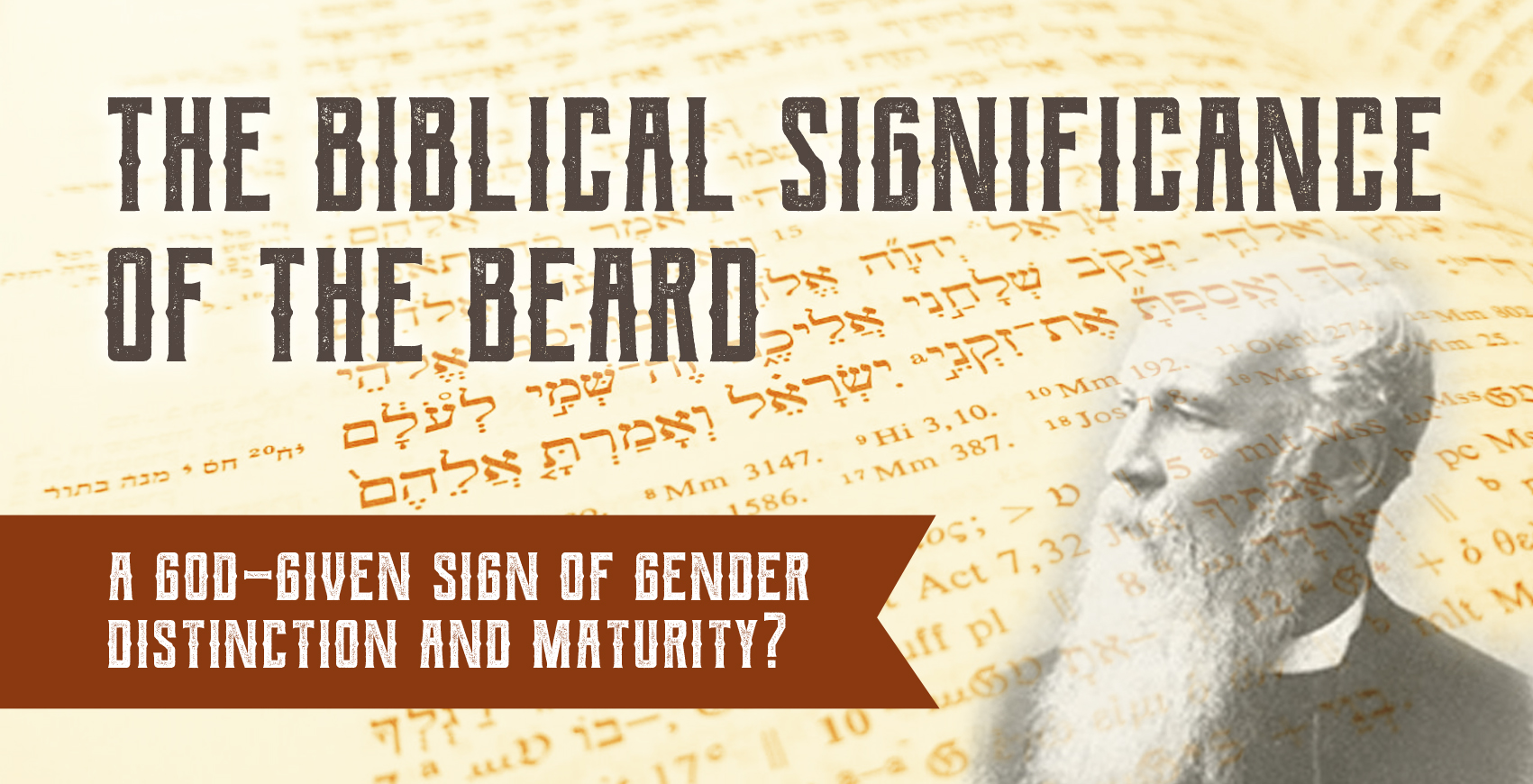
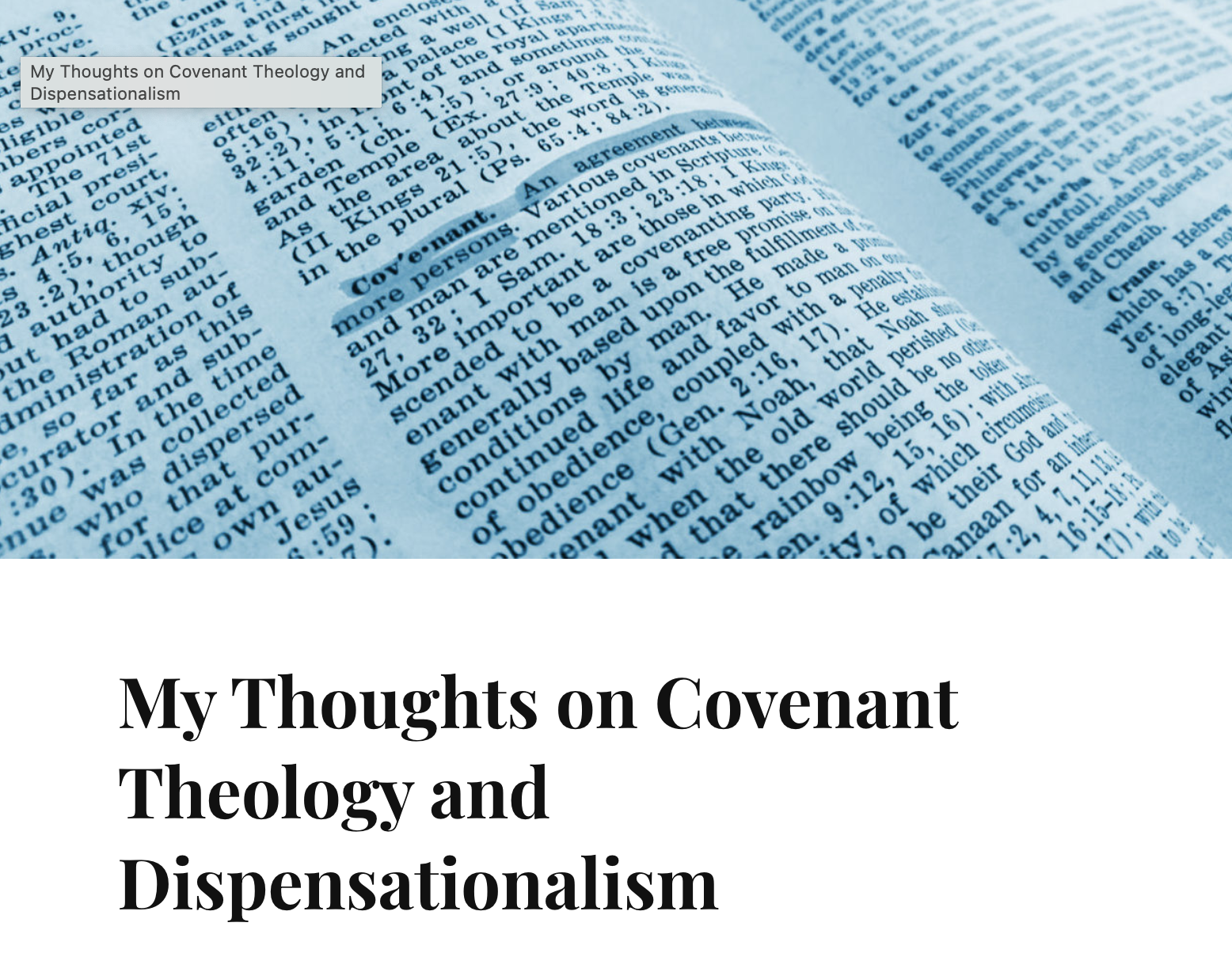
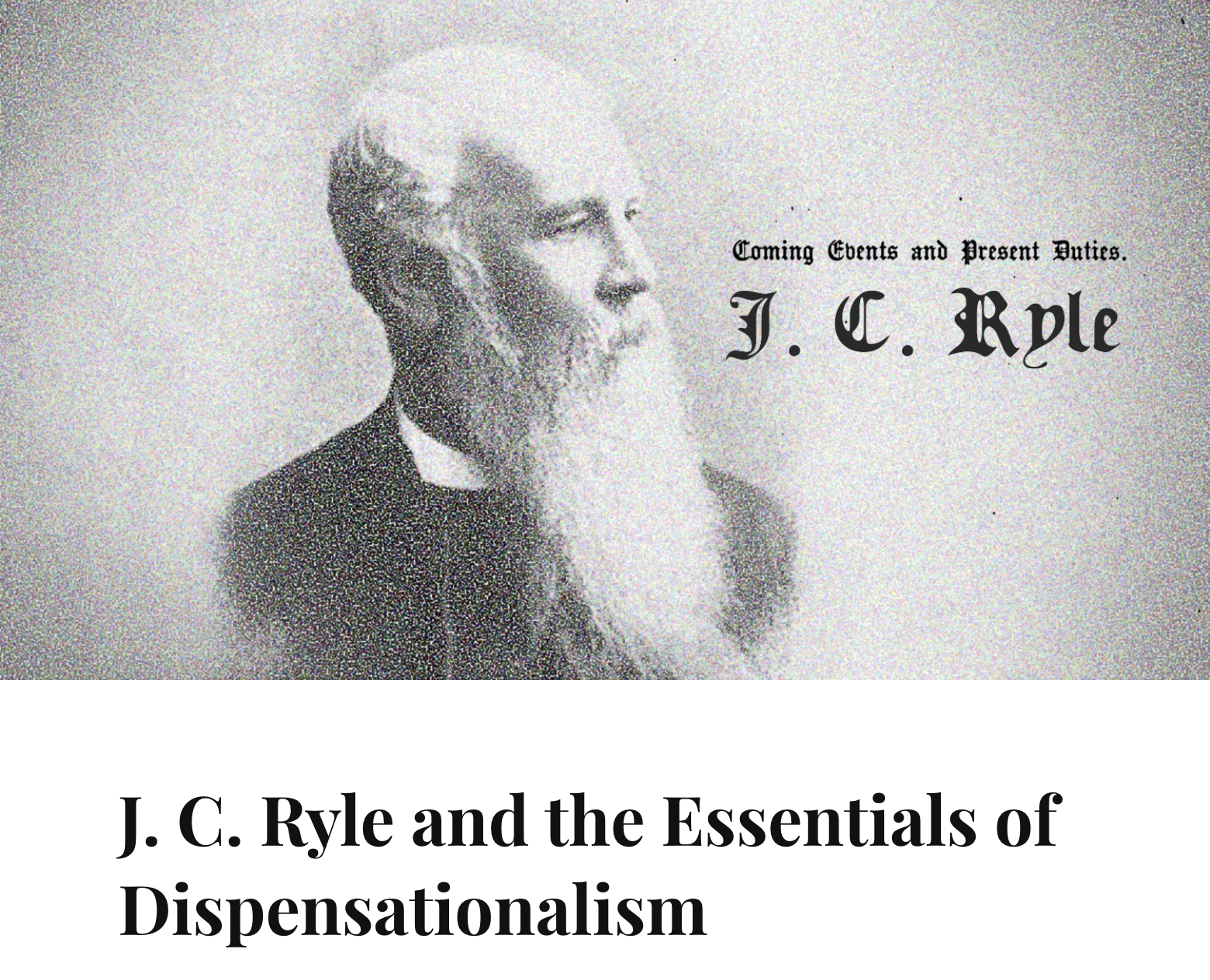
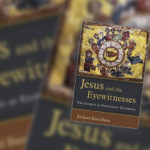
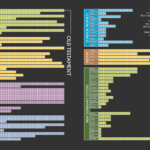





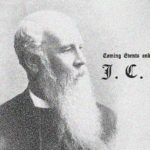
Jeanne Wells
Thank you, Miska, for this detailed analysis…very helpful and very well-written for someone whose first languages were Swedish and Finnish! 😉
Miska wilhelmsson
Thank you Jeanne! I’m glad you found it helpful 🙂
Kevin Hughes
Another Thank You for this article. I like your statement “I would still be slightly hesitant in describing myself as a ‘dispensationalist’”. My way of saying this, for myself, is that the Dispensational approach is best, Literal Interp etc….. But I don’t believe in its principles and theology because Dispensationalist say so, But because Scripture says so, when Literal approach is applied in all cases.
John Warren Antalika
This is excellent brother! Currently immersed in this in the study of dispensationalism and covenant theology.
Andrew Fine
Miska -your ‘eyes wide open’ approach is much appreciated sir -blessings to you & yours !
Sara
Fantastic and well-reasoned overview. You have hit on so many thoughts I’ve had before. Like this:
“My short answer would be, yes, if rightly defined I do hold to a dispensational view of approaching Scripture. That being said, I would still be slightly hesitant in describing myself as a ‘dispensationalist’, especially if I had no opportunity to then explain in more detail what I mean by that title. I have seen it first-hand that there are many strange ideas that people attribute to people who would identify themselves as dispensationalists, therefore I think that the term is not the most helpful in seeking to accurately communicate my theological position to others, since many will likely understand the term to stand for something different than what I would understand it as.”
Yes, yes, yes!!! As a dispensationalist, I attended a reformed Presbyterian church (historic premill) for 13 years and I don’t think almost anyone there truly understood what dispensationalism was and had preconceived ideas of what I believed based on pop-culture dispensationalism and straw men arguments. I always wished I could give an entire explanation (much like you’ve done here) any time it came up. 🙂
And this is a superb point:
“Another, perhaps surprising strength in dispensationalism is the continuity that exists between the storyline of the OT and the NT. This might sound strange, since much of the time dispensationalism is characterized as emphasizing the discontinuity between the OT and the NT. It certainly is true that dispensationalism rightly points out some of the discontinuities between Israel and the church, whereas covenant theology seeks to merge them into one, claiming that one replaces or supercedes the other.”
Yes! When I went to Bible college, studying all of Scripture and gaining a deeper understanding of dispensationalism, I was struck by how much CONTINUITY dispensationalism adheres to that CT does not. The entire Bible (especially the prophetic books) makes much more sense on the continuum of progressive revelation from a dispensational view than they do from the CT view – they attempt to force a unity upon the text about certain facets that aren’t there and thus end up doing the opposite of what they intend, by ignoring/spiritualizing large portions of prophetic passages and ending up with discontinuity between the OT and NT. I’ve always felt that dispensationalism gives the best answer to the whole story of Scripture (even if individual dispensationalists don’t always do that!).
Pat
Balanced,Honest and thoughtful. Thank you
Robert Woodbeck
Thanks! that was a really well written, concise explanation with really salient points. Especially in reference to what I think is most important, that is, God’s faithfulness and being able to trust what he actually said. Its a dangerous road to try and interpret what God has said rather than simply believing what he said!
JK
Good article. Sometimes the explanation can get bogged down in the details. Giving the reader a big picture interpretation of what is unique in this theological system should motivate a reader to then go read the Bible and confirm or deny. Thx.
Pastor Dave Stockeland
Just happened on your article here. Thank you so much! Very well written and with honesty, humility and respect for brethren that see otherwise. When I start reading an article or listening to a presentation and the author or speaker starts out by bashing those Christians that think differently…I am done. God bless you for your spirit of grace!
Steven Paul Sloan
As a fairly new Christian, the subjects of Covenant Theology and Dispensationalism have been confusing and distracting. Thank you for a clear and concise explanation of both. Now I can get back to actually studying the word of God with a better understanding of the words of men.